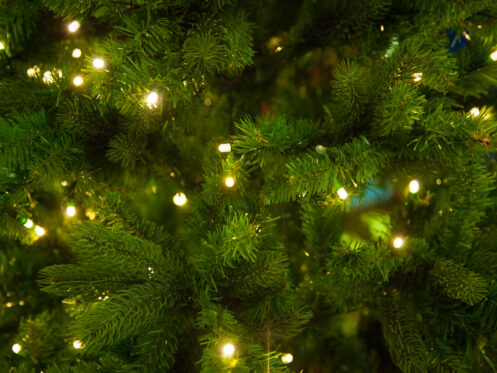The holiday season is right around the corner, which means many people will soon start putting up all of their lights and decorations. While decorating your home for the holidays is a great way to get into the festive spirit and make everything more cheerful, holiday decorations can also create various fire and electrical hazards. As such, it’s important that you know what steps you should take to ensure you can safely enjoy the holidays and avoid any safety issues.
Common Holiday Electrical Hazards
It’s probably not all that surprising to learn that the number of home fires is higher during the winter holidays compared to most other times of the year. In fact, the only other time that even comes close is the 4th of July due to people shooting off fireworks. One of the main reasons why there is a big increase in fires over the holidays is that people have so many different decorations and other things that can be fire hazards, such as lit candles, extension cords and power strips.
Christmas tree fires are especially common and can happen for a few different reasons. One is wrapping a real tree with incandescent lights that can get hot enough to cause the tree to catch fire if its needles get too dry. Nonetheless, statistics show that nearly 1/3 of Christmas tree fires occur as a result of some type of electrical fault. This can include something like using a damaged string of lights with bare wires, which can end up short circuiting and producing sparks that ignite the tree.
Another reason why so many fires happen is that people try to power too many lights and decorations off of one electrical circuit. This can end up overloading the circuit, which means you’re drawing more watts than what the wiring on the circuit is rated to handle. Any time a circuit gets overloaded, the additional power flowing through its wiring can cause the wires to quickly overheat and potentially start melting and setting nearby building materials on fire. This normally won’t happen because the circuit breaker should immediately trip any time it senses the circuit is overloaded.
The problem is that circuit breakers can wear out or get stuck so that they fail to trip in the event of an overload. That means the power will continue flowing and create a high likelihood of an electrical fire starting. Having a failed circuit breaker is more common than you may think since there is no way for you to test a breaker yourself to see if it’s still good or if it needs to be replaced.
How an Electrical Safety Inspection Can Help Prevent Hazards
Electrical issues, like a failed breaker, damaged wire or loose connection in an outlet, can arise at any time and create a severe risk of a fire occurring in your home. Issues with a bad outlet catching fire are quite common during the holidays since many people have certain outlets inside or outside the home that they rarely, if ever, use for anything but plugging in holiday lights and decorations.
Most experts recommend having an electrical safety inspection performed at least once every few years or even yearly if any part of your electrical system is older than 20 years. If you haven’t had a licensed electrician inspect your electrical system in the past few years, it’s definitely worth having it done before you start hanging up all of your holiday decorations so that you can avoid potential safety hazards.
One thing an electrician will always do when performing a safety inspection is check your electrical panel and breaker box for any issues. This includes testing to make sure none of the breakers are faulty as well as looking for signs of rust and corrosion, both of which can potentially make it so that a breaker can’t trip when it should. Checking all of the outlets for any loose wires or other issues is also important for ensuring they remain safe to use.
Another thing an electrician will check is what kind of outlets all of your outdoor power receptacles have. The National Electric Code now requires all outdoor power receptacles in new homes to be a GFCI (Ground Fault Circuit Interrupter) outlet or on a circuit that has a GFCI circuit breaker. GFCI outlets and breakers work to greatly reduce the risk of shocks and electrocution that can occur as a result of a damaged cord or wiring or if any electrical wires come into contact with water.
GFCI outlets have an internal mechanism that is similar to a circuit breaker and will immediately stop power from continuing to flow out of the outlet if a ground fault occurs. A ground fault is when electricity escapes out of the normal circuit and takes a different route, such as a person’s body, that allows it to flow into the ground unimpeded. While you’re not legally required to replace old outdoor outlets with GFCIs except when performing major renovations, it’s still a good idea since it will greatly reduce the chances of anyone getting shocked or electrocuted.
The Importance of Inspecting All Decorations and Cords
One thing you should always make sure to do when getting out your holiday decorations and lights is to fully inspect each one before plugging it in. Similarly, you also want to inspect any extension cords and power strips you plan to use. The main thing to check for is that the sheathing around cords and wires is fully intact and you don’t see any exposed wires.
Exposed wires can be extremely dangerous since you can end up with the live wire touching either the neutral wire or ground wire, which can result in the wires sparking. If the live wire touches anything metal, it can also produce a ground fault that would shock or electrocute you if you touched the same piece of metal. Any time the live wire touches either of the other wires, it leads to a major spike in voltage as well, which can cause the wires to overheat and start a fire. If you’re using any power strips, you also want to make sure that none of the receptacles shows any signs of burning, smoking or melting since these issues indicate that the strip is a fire hazard and unsafe to use.
If you’re plugging any outdoor decorations into an extension cord, the other thing to do is check the label on the cord to make sure it is rated for outdoor use. All outdoor cords are grounded, which means they can safely redirect power to the outlet’s ground wire should a spike ever occur. If you have a cord that isn’t grounded, any spike in power can potentially cause it to get hot enough that it starts a fire. There’s also a high chance that a voltage spike will ruin whatever you have plugged into the cord.
Since 2000, 3 Mountains Home Services has been one of the leading home service companies in Beaverton and other parts of the Portland, OR metropolitan area. We have a dedicated team of licensed electricians that can handle your electrical inspection, repair, electrical panel, and installation needs to help ensure you don’t encounter any safety hazards this holiday season. To schedule an electrical safety inspection or any type of HVAC or plumbing service, contact us today.


